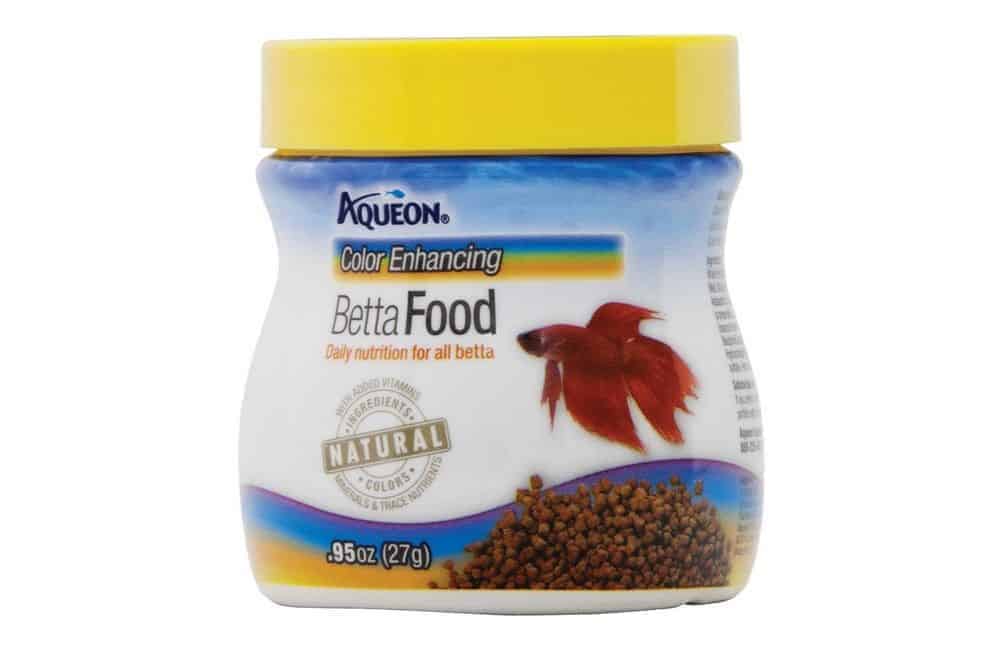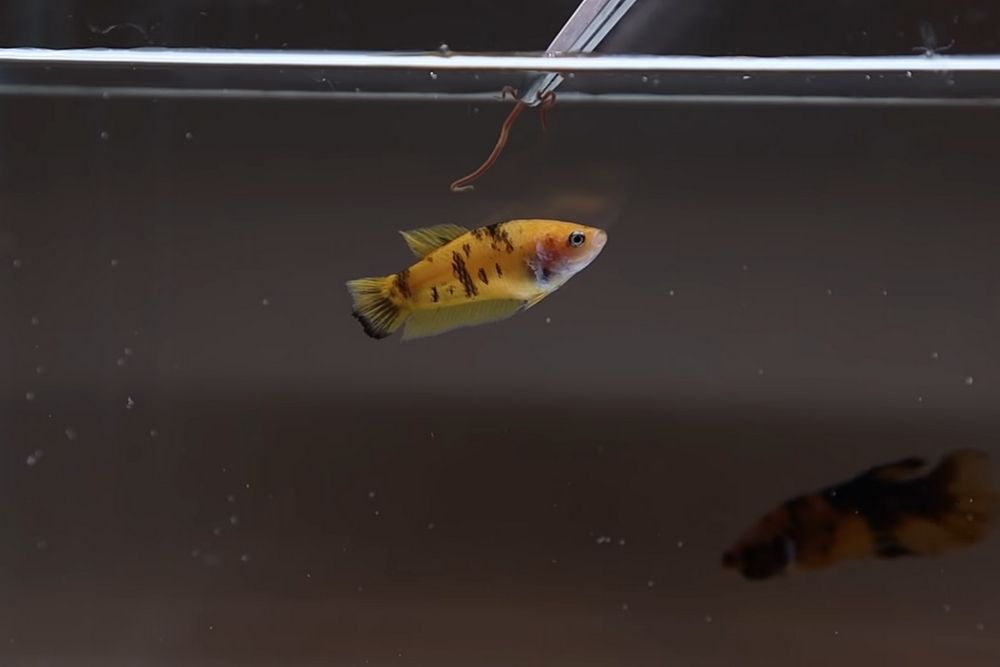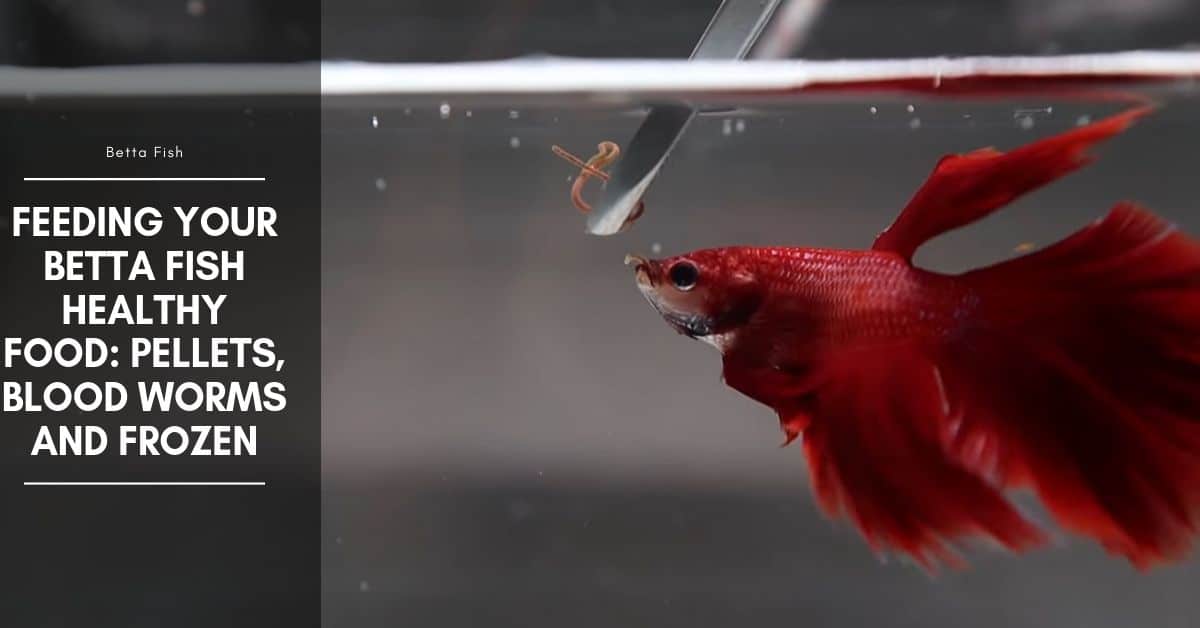Just like with us, there’s healthy food for betta fish and unhealthy food. Your betta may be able to survive on only a diet of cheap general fish flakes, but that can have an impact on its health down the line.
Betta fish are carnivores
First of all, bettas are carnivores and need a protein-rich diet. Most tropical fish flakes are plant-based, which means you would need to supplement with more meaty options for optimal health. Good options are pellets designed specifically for bettas and frozen or live bloodworms, brine shrimp, and daphnia.

Types of food for your betta fish
If possible, try to provide your betta with a mix of different food options. You wouldn’t want to eat the same thing every single day, and neither does your betta.
Pellets/flakes
Look for a betta-specific pellet that is high in crude protein (at least 30%). Floating pellets are best since bettas naturally eat off the surface of the water, but they may be okay with sinking pellets if they learn where to look for them. There are also flakes designed specifically for bettas, but remember to check their protein content before buying.
Tetra AquaSafe Plus, 8.45 Ounces, aquarium Water Conditioner And Dechlorinator, Model Number: 46798162681
15% OffAPI TAP WATER CONDITIONER Aquarium Water Conditioner 16-Ounce Bottle
(as of July 17, 2024 07:37 GMT +03:00 - More infoProduct prices and availability are accurate as of the date/time indicated and are subject to change. Any price and availability information displayed on [relevant Amazon Site(s), as applicable] at the time of purchase will apply to the purchase of this product.)API STRESS COAT Aquarium Water Conditioner 4-Ounce Bottle (85B)
40% Off
Blood Worms
Bettas tend to adore blood worms! The most convenient way is to buy them frozen and you should be able to find them at most pet stores. The come in little cubes, but one cube is way too much for your betta to eat at once. Cut a little piece of the cube off, place it in a little cup with a bit of your tank water, and allow it to melt. One or two worms is more than enough for a meal.

Other frozen or freeze-dried foods (brine shrimp, daphnia, etc.)
Because these are lower in nutritional value, they should be used as treats rather than a main source of food. I can say from experience that all my bettas (and the rest of my tropical fish, for that matter) definitely love chowing down on some brine shrimp! Follow the general instructions above for cutting off a small piece of the frozen cube and letting it melt.
How often should you feed your betta?
You’ll want to feed your betta small amounts once or twice per day. It’s very easy to overfeed bettas, especially with flakes, so a general rule of thumb is to think of their stomach as the size of their eye—way smaller than you’d think! That means only a couple of pellets each time and fewer if you’re feeding more often during the day. Many betta keepers also fast their fish one day per week to combat bloating caused by accidental feeding. Bettas will keep eating as much food as there is, so make sure to remove any uneaten food after a few minutes to keep your betta from pigging out on the leftovers.
Don’t be alarmed if your betta spits some of its food out, as that typically means that the piece was just too big so it’s biting off a smaller chunk to swallow. You can help out by breaking up the food a bit before putting it into the tank.
How to prevent bloating in betta fish?
Bloating is a serious issue, as it can lead to swim bladder problems. Always soak pellets or freeze-dried food in a bit of tank water before feeding to ensure the food doesn’t swell in the betta’s stomach. If you notice your betta is bloated, fast it for a couple of days and see if the bloating improves. If not, try feeding daphnia for a couple of days, then fasting for a couple more. Some people also recommend de-shelled peas in place of the daphnia, although there are mixed opinions on whether they actually work.
If you’re going on vacation, be cautious with vacation feeders and the like. The wafer-like fish feeders can easily foul your water, leading to a spike of ammonia that can damage your fish. Automatic feeders are also known to break and dump a bunch of food into the tank, resulting in the same water problems. If you’re only going to be gone for a couple of days, your betta will likely be fine; longer than that, consider getting a friend or family member to come feed your betta—but leave clear instructions or portion out the food ahead of time to ensure that your betta isn’t overfed while you’re gone.

Hi, my name is Sean, and I’m the primary writer on the site. I’m blogging mostly about freshwater and saltwater aquariums, fish, invertebrates, and plants. I’m experienced in the fishkeeping hobby for many years. Over the years I have kept many tanks, and have recently begun getting more serious in wanting to become a professional aquarist. All my knowledge comes from experience and reading forums and a lot of informative sites. In pursuit of becoming a professional, I also want to inspire as many people as I can to pick up this hobby and keep the public interest growing.
Read more about Sean.
Please join also my Facebook group.



















